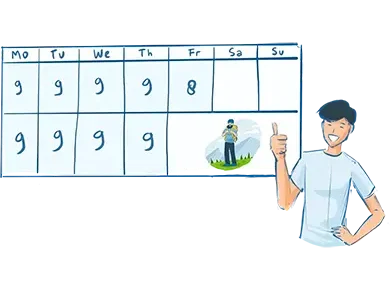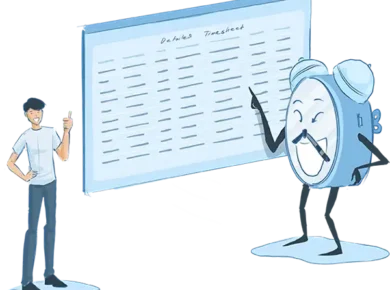How many hours do you waste during a typical workday? Four, maybe five hours? No matter which industry you work in, those lost hours can derail your plans for a promotion or a successful career for that matter. Time-management skills and tools can ensure you remain on a productive path.
If you are currently working from home, chances are you have more time than you know what to do with. At this time, time-management is more important than you realize. You may be wasting away hours without realizing it or maybe you have difficulty shutting off as the hours bleed into one another.
The Concept of Time in terms of Productivity
Traditionally, time is defined as a period in which certain events occur. However, this simple definition does not describe the complexities it involves. Sure, the clock may tell you that you have two hours to prepare a presentation.
However, it does not take emergencies or unplanned events into account. If your plans are disrupted by an emergency call from home or an email thread, your presentation will leave much to be desired.
Contrary to popular belief, the longer you work, the less time you will have. Some people think the more hours they spend at the office the better. This thought process is not uncommon. People equate being busy with being productive when that is just not the case.
Top Time-Management Tips to Enhance Productivity
We can find ways to save time, but we have to be smarter about it. Sometimes, it’s about taking things out of your schedule than putting more in.
Here are some ways you can have more hours in the day without burning out:
Time-Management Tip #1 – Start Your Workday Early
There is a reason why successful entrepreneurs, such as Mark Zuckerberg and Bill Gates, look so fresh and stress-free. They start their workday early. It allows them to plan out their day in a serene environment. This, in turn, translates to a productive and stress-free workday.
Think about it. When you get up early in the morning, your mind is well-rested and you are full of energy. Plus, since everyone is asleep, you can start work without any disruptions. Anything from a ringing doorbell to sending the kids to school can make you lose motivation and focus.
If you are not a morning person, just waking up half an hour before your usual time will do wonders for your productivity. Use those minutes to get in some yoga or light exercise to jumpstart your brain. Prepare a healthy breakfast afterward and your mind will be focused enough to help you schedule your time wisely.
Time-Management Tip #2 – Maintain A To-Do List
When you get up earlier than your usual time, you will have plenty of time to devote to a to-do list. A list will help you break down projects and goals into workable parts. Think of your workday as a jigsaw puzzle and this tactic will make sense.
By creating a list of things that each project is made of, each task will seem do-able, not insurmountable! Besides keeping stress at bay, this practice will keep you motivated. Each time you complete an item on the list, you will be encouraged to take on the next.
The best thing about this tip? Even if you are interrupted, you can pick up where you left off immediately after. That way, you can meet deadlines and impress employers without breaking a sweat.
Time-Management Tip #3 – Prioritize Smartly
After creating a workable to-do list, your job isn’t over. To maximize its efficiency, prioritize tasks in order of urgency. Place on top the tasks that have close deadlines as well as their due date. Similarly, place tasks that can be put off for a while. This includes non-urgent emails that won’t take up a lot of time.
Or, if you are really stressed out, you can tackle smaller tasks first irrespective of urgency. It will give your brain time to flex and relax as you complete each task. Plus, don’t forget to cross off each task from the list as you complete it. The satisfaction you feel as you cross them, out will also give you a boost of serotonin which will ease that stress slowly but surely.
Time-Management Tip #4 – Take Regular Breaks
The burst of adrenaline you feel as you go through that to-do list is good only insofar as you know how to channel it. You can easily lose track of time because of the high you will get as you knock each task out of the part. This can stress out your mind and body and you may not realize the danger until it is too late.
To prevent this from happening, schedule a 10 break every 20 or 30 minutes depending on your workload. The practice will allow your tired brain to relax and take a load off. Plus, it will also allow you to process the information you went through peacefully.
The result? Renewed vigor when you return to work. Plus, since you will know you have scheduled breaks planned, you will be able to push through each task at hand. Take a walk (away from the office if possible), spend time chatting with colleagues, etc. Just get away from that screen for at least 10 minutes so your brain can unwind.
Time-Management Tip #5 – Plan Ahead
Your workday does not start as soon as you open your eyes in the morning. However, if you don’t have a plan in place, your brain will automatically go into work mode as soon as you wake up. In other words, you will wake up stressed, and even trivial matters may overwhelm you.
Here is what you must do. Before you head out to work, spend 15 minutes organizing your schedule. This includes the aforementioned to-do list. When you get to work, choose tasks that are prioritized on the list and focus on them for the first half of the day.
This is important because your energy will start to flag after lunch whether you eat a heavy or light meal. Even with low energy, you will be able to tackle tasks that are down the list.
If you leave priority tasks for after lunch, you will end up with more stress and work for the next day. The sense of achievement you will feel will allow you to power through the rest of the day.
Time-Management Tip #6 – Use a planning tool such as PlanArty
The human mind can only take so much information before burning out. Rather than cramming more information in there, opt for time-management solutions, such as PlanArty. we benefit from features, tools, and techniques that cover the following areas:
Time management features
Business features
Productivity boosters
Time-Management Tip #7 – Learn to Say ‘No’
Coming back to our original argument – you only have limited hours in the day. If you take on new tasks without completing your list, your schedule will be ruined. If you get a request from your boss, check if it is a priority first then agree/disagree.
While refusing may make you nervous, think about the time you will save. Rather than saying no flat out, explain why you cannot take on a new task. Say something along the lines of ‘I wish I could but this client has been on our case for a few days and I really want to resolve his problem first.’
That way you can hit two birds with one stone – convince your boss you are a proactive employee and remain on schedule at the same time.
Efficient time management can help you overcome hurdles that may seem insurmountable at first. Try out PlanArty and the aforementioned tips to master the clock.





